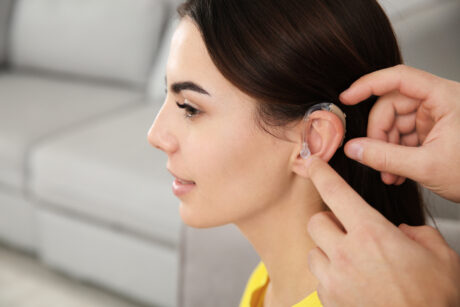Imagine you’re at a bustling party, surrounded by lively conversations and music. Yet, amidst all the noise, you effortlessly tune out the background chatter to focus on the fascinating story your friend is telling. That’s selective hearing in action!
What is the meaning of selective hearing? It’s our brain’s natural ability to filter out irrelevant sounds and prioritise the ones that matter most. This essential function, also known as selective auditory attention, plays a crucial role in our daily communication and allows us to navigate noisy environments with ease.
What is Selective Hearing?
Is selective hearing a real thing? Yes! Selective hearing, or selective auditory attention, is your brain’s remarkable ability to pick out specific sounds from a noisy environment. Think of it as your brain’s own personal volume control, amplifying the sounds you want to hear and turning down the ones you don’t.
But how does this work?
- Sound waves enter your ears and are converted into electrical signals.
- These signals travel to your brain, where they are processed and interpreted.
- Your brain then filters these signals, focusing on the most relevant ones based on your current needs and attention.
This filtering process is closely linked to your attention span and cognitive abilities. Some selective hearing examples include:
- Focus on a conversation in a crowded room.
- Ignore distracting noises while working or studying.
- Quickly identify important sounds, like a siren or someone calling your name.
While this “tuning out” is a natural brain function, it’s important to be aware that difficulties with selective hearing can sometimes be a sign of an underlying issue. For example, selective hearing can be impacted by:
- Hearing loss: When you have trouble hearing certain frequencies, your brain may struggle to filter sounds effectively.
- Cognitive decline: Conditions like dementia can affect the brain’s ability to process and prioritise auditory information.
- Neurological conditions: Some neurological conditions can interfere with the brain’s auditory processing pathways
Selective Hearing Symptoms
While selective hearing is a normal and essential ability, sometimes it can be a sign of an underlying issue. Here are some selective hearing symptoms to watch out for:
- Difficulty following conversations in noisy environments: Do you often find yourself asking people to repeat themselves, even in moderately noisy settings?
- Frequently misinterpreting what others say: Are you often accused of “not listening” or mishearing instructions?
- Struggling to focus on a single speaker when multiple people are talking: Does your mind seem to wander during group conversations?
It’s important to remember that everyone experiences these situations occasionally. However, if you consistently struggle with these symptoms, it’s worth consulting an audiologist. They can help determine if your selective hearing difficulties are related to a hearing impairment or other underlying condition.
Selective Hearing vs Selective Listening
While the terms “selective hearing” and “selective listening” are often used interchangeably, they actually represent distinct concepts.
Selective Hearing
This is an involuntary process where your brain automatically filters sounds, prioritising those that are most relevant to you at that moment. It’s a natural function that helps us navigate noisy environments and focus on important information.
Example: Imagine you’re engrossed in a captivating novel, completely immersed in the story. The air conditioner hums softly in the background, but your brain effortlessly filters it out, allowing you to remain focused on the words on the page. You’re not consciously choosing to ignore the hum, your brain is simply prioritising the sounds that are most important for your current task.
Selective Listening
This is a conscious choice to focus on certain sounds or voices while ignoring others. It often involves a deliberate effort to block out distractions or avoid engaging with specific information.
Example: A teenager is engrossed in a video game, headphones on, completely oblivious to the world around them. Their parent calls out repeatedly, asking them to take out the trash. The teenager, however, “tunes out” their parent’s voice, choosing to focus solely on the sounds of the game. This is a deliberate act of selective listening, where the teenager is actively ignoring external stimuli to maintain their focus.
Selective Hearing Examples in Everyday Life
Selective hearing is constantly at play in our daily lives, helping us navigate a world full of sounds. Here are a few selective hearing examples:
- Conversations in crowded places: Imagine trying to have a conversation at a busy restaurant. Your brain automatically filters out the surrounding chatter, allowing you to focus on your companion’s voice.
- Following instructions in a noisy classroom: Students rely on selective hearing to focus on the teacher’s voice amidst the rustle of papers and whispers of classmates.
- Noticing your name in a crowd: Even when engrossed in a conversation, you’re likely to perk up if you hear someone call your name from across the room.
What Causes Selective Hearing
Selective hearing is a complex phenomenon with a variety of contributing factors. It’s important to understand what causes selective hearing to distinguish between its natural occurrences and instances where it might signal a deeper issue.
- Biological Causes: Our brains are wired to filter information, and this includes auditory input. This cognitive filtering is a natural process that helps us prioritise important sounds and avoid sensory overload.
- Situational Causes: Our environment and mental state can influence selective hearing.
- Stress: When we’re stressed, our brains may struggle to filter out irrelevant noises, making it harder to focus.
- Fatigue: Mental exhaustion can impair our cognitive abilities, including auditory attention.
- Noisy environments: In particularly loud or chaotic settings, our brains may have difficulty prioritising sounds, leading to missed information or misinterpretations.
- Health-Related Causes: In some cases, selective hearing difficulties may be linked to underlying health conditions.
- Hearing loss: If you have trouble hearing certain frequencies, your brain may struggle to filter sounds effectively. This can lead to difficulties understanding speech in noisy environments or mishearing instructions.
- Neurological conditions: Conditions affecting the brain’s auditory processing pathways can also impact selective hearing.
Is Selective Hearing a Real Thing?
Selective auditory attention, as it’s scientifically known, is deeply rooted in how our brains process information. Our sensory systems are constantly bombarded with stimuli, and our brains have evolved to filter out the noise and prioritise what’s important. This is crucial for survival, imagine if you couldn’t distinguish a predator’s growl from the rustling of leaves!
Here’s how science proves selective hearing is real:
- Brain Imaging Studies: A brain research study conducted in 2022 using techniques like fMRI observed that when we focus our attention on a specific sound, certain brain regions associated with auditory processing become more active, while others show decreased activity. This demonstrates that our brains actively select and prioritise auditory input.
- Cocktail Party Effect: This classic example of selective hearing demonstrates our ability to focus on a single conversation in a noisy environment. Studies have shown that even when surrounded by multiple conversations, our brains can isolate and process the speech we’re attending to, effectively “tuning out” the rest.
- Dichotic Listening Tests: In these experiments, participants wear headphones and are presented with different sounds in each ear. They’re instructed to pay attention to one ear while ignoring the other. These tests consistently show that people are more likely to remember information presented to the attended ear, demonstrating the brain’s ability to filter auditory input.
Is Selective Hearing Bad?
Selective hearing often gets a bad rap, but is it always a negative thing? The truth is, it depends on the context.
When selective hearing is beneficial:
- Focusing amidst distractions: In a noisy world, selective auditory attention allows us to concentrate on the most important sounds.
- Protecting our mental health: By filtering out overwhelming or distressing sounds, selective hearing can act as a buffer for our mental well-being.
- Prioritising important information: Our brains naturally tune in to sounds that are relevant to our needs and goals, helping us stay safe and efficient.
When selective hearing becomes problematic:
- Miscommunication and conflict: In relationships, selective hearing can lead to misunderstandings, hurt feelings, and arguments. If we consistently “tune out” our partner, friends, or family members, it can damage communication and create distance.
- Missed opportunities: If we’re not careful, selective hearing can cause us to miss important information or instructions, potentially leading to mistakes or missed opportunities.
- Safety concerns: In certain situations, like driving or crossing the street, failing to pay attention to crucial auditory cues can have serious consequences.
Finding the balance:
The key to managing our selective hearing ability lies in recognising when it’s helpful and when it’s hindering us. Here are some tips:
- Be mindful of your listening habits: Pay attention to when you’re tuning people out and ask yourself why.
- Practice active listening: Make a conscious effort to engage with the speaker, make eye contact, and ask clarifying questions.
- Communicate your needs: If you’re feeling overwhelmed or distracted, let others know so they can adjust their communication style.
- Address underlying issues: If you suspect your selective hearing is related to hearing loss or other health conditions, seek professional help from an audiologist.
How to Fix Selective Hearing
While selective hearing is a natural process, sometimes it can become problematic, leading to miscommunication, missed opportunities, or even safety concerns. If you’re struggling with the negative effects of selective hearing, here are some strategies that can help:
Auditory Training Exercises
Just like any skill, auditory attention can be strengthened with practice. Here’s how:
- Focused listening: Engage in activities that require focused listening, such as listening to audiobooks or podcasts with varying levels of background noise. Start with simpler auditory environments and gradually increase the complexity.
- Sound identification: Practice identifying different sounds in your environment. This can help train your brain to better distinguish between relevant and irrelevant noises.
- Dichotic listening exercises: These listening rehabilitation exercises involve listening to different sounds in each ear and focusing on one while ignoring the other. This can help improve your ability to filter auditory information.
Speech and Language Therapy
If your selective hearing difficulties are impacting your communication skills, speech and language therapy can be beneficial. A therapist can help you:
- Improve auditory processing: Develop strategies for better understanding speech in noisy environments.
- Enhance communication skills: Learn techniques for active listening, clarifying information, and expressing your needs effectively.
- Address underlying language difficulties: If language processing challenges contribute to your selective hearing, therapy can target those specific areas.
This is particularly helpful for individuals with hearing loss or related cognitive challenges.
Cognitive Behavioral Therapy (CBT)
Stress and anxiety can exacerbate selective hearing difficulties. CBT can help you:
- Manage stress and anxiety: Learn coping mechanisms to reduce the emotional and cognitive burden that can interfere with auditory attention.
- Develop focus strategies: Acquire techniques to stay present and attentive in challenging listening situations.
- Challenge negative thought patterns: Address any underlying beliefs or anxieties that contribute to selective listening.
Lifestyle Adjustments
Simple lifestyle changes can also make a difference:
- Reduce stress: Engage in stress-reducing activities like mindfulness, meditation, or exercise.
- Prioritise sleep: Ensure you’re getting adequate sleep, as fatigue can significantly impair auditory attention.
- Create a conducive listening environment: Minimize distractions and background noise whenever possible.
Assistive Technology
In some cases, assistive technology can be helpful:
- Hearing aids: If hearing loss contributes to your selective hearing difficulties, hearing aids can amplify sounds and improve your ability to filter noise.
- Noise-cancelling headphones: These can help block out distracting sounds and create a more focused listening environment.
Key Takeaways: Improving Your Understanding of Selective Hearing
Selective hearing, while often used in a lighthearted way, is a fascinating and complex cognitive ability that plays a significant role in our daily lives. It allows us to navigate noisy environments, focus on important information, and protect our mental well-being.
However, it’s crucial to remember that selective hearing can also lead to communication challenges and misunderstandings, especially if it becomes a pattern in our relationships. Understanding the difference between selective hearing (an involuntary process) and selective listening (a conscious choice) is key to improving our communication skills and avoiding conflict.
If you’re concerned about your own selective hearing or that of someone you know, remember these key takeaways:
- Selective hearing is a real phenomenon: It is a scientifically proven cognitive ability.
- It’s a natural part of human perception: Our brains are wired to filter auditory information, and this is essential for survival and efficient functioning.
- It can be both beneficial and problematic: While selective hearing helps us focus and avoid sensory overload, it can also lead to miscommunication and missed opportunities.
- It can be influenced by hearing loss: While a natural ability, difficulties with selective hearing can sometimes signal an underlying hearing impairment.
- There are ways to improve selective auditory attention: Auditory training exercises, speech therapy, CBT, and lifestyle adjustments can all help enhance focus and manage the negative effects of selective hearing.
Important Note: If you suspect that you or someone you know is experiencing difficulties with selective hearing that go beyond typical everyday occurrences, don’t hesitate to seek professional advice. An audiologist can conduct a comprehensive evaluation and recommend appropriate interventions.
Book an appointment with the hearing specialists at Listening Lab today if you have any concerns about selective hearing or other hearing issues.
About Listening Lab Singapore
At Listening Lab Singapore, we’re passionate about helping people rediscover the joy of hearing. We understand that hearing loss can significantly impact your quality of life, affecting your relationships, work, and overall well-being. That’s why we’re dedicated to providing personalised hearing care solutions that meet your unique needs and lifestyle.
Why Choose Listening Lab?
- Expert Hearing Tests: We offer comprehensive hearing tests conducted by experienced audiologists using state-of-the-art equipment. Our thorough evaluations accurately assess your hearing loss and identify any underlying conditions.
- Personalised Hearing Aid Prescriptions: We take the time to understand your individual needs and preferences, and our personalised fittings ensure optimal comfort and performance.
- Wide Selection of Top Brands: We offer a wide range of hearing aids from renowned brands like Signia hearing aids.
- Ongoing Support and Care: Our commitment to your hearing health extends beyond your initial fitting. We provide ongoing support, adjustments, and maintenance to ensure your hearing aids continue to perform at their best.











